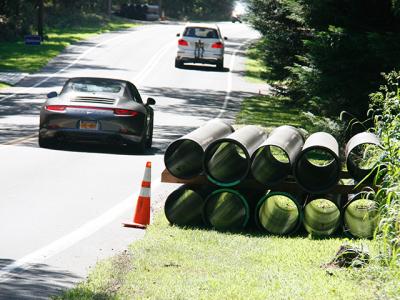Sticker Shock Over Water Mains

It wasn’t long after the earthmoving equipment began digging a trench into Windsor Lane in Wainscott, commencing a months-long effort to install approximately 45,000 feet of water main in the hamlet, that reports of sticker shock began circulating.
One homeowner, who asked not to be named, told The Star that the Suffolk County Water Authority informed him that connecting the house on his flag lot to public water would cost $93,775. Another property owner complained to East Hampton Town Supervisor Peter Van Scoyoc via email that authorizing the water authority’s contractor, Asplundh Construction, to connect his house would cost $14,800, while a local contractor quoted just $2,338.
"The residents of Wainscott are paying attention," He wrote, "and virtually everyone I speak with is ready to vote the lot of you out of office."
The Aug. 20 commencement of the water main extension followed the discovery of perfluorinated chemicals in more than 150 private wells in the hamlet to date, the declaration of a state of emergency, the establishment by the town board of a water supply district, and the board’s partnering with the water authority to develop the project. In the interim, the town provided free bottled water to affected residents and offered a rebate of up to $3,000 for those opting to install a point-of-entry water treatment system.
The cost of extending the water mains throughout the hamlet will be covered through a bond issue, to be repaid in taxes assessed to all the town’s residents outside the villages. Property owners, however, are responsible for the expense of connecting the main to their residence, should they choose to do so. Should property owners use the water authority’s contractor, the town would pay the cost up front, and residents would repay it through a special assessment on their property tax bill, amortized over at least 20 years.
That structure is behind the sticker shock: Publicly bid labor contracts are typically three to four times higher, or more, than private contracts because of public procurement rules including Wicks Law, a state law mandating the use of independent prime contractors — large companies that handle sizable and complex government undertakings — for most projects.
The town board issued a statement on Monday encouraging Wainscott residents who plan to connect to public water to solicit estimates from both the water authority’s contractor and a private plumber. “The water authority must adhere to state law and bidding procedures,” according to the statement, “including selecting the lowest responsible bidder; winning bidders are required to meet certain Department of Labor and insurance requirements, which drives up costs.”
Hiring a private plumber, which residents are free to do, is likely to cost significantly less, the release said, but that cost would be the property owner’s responsibility. “Every property owner,” Mr. Van Scoyoc said at the town board’s meeting on Tuesday, “has to make that decision on their own.”
The town has instructed the water authority to “make residents fully aware of their options before they are asked to make a choice,” according to Monday’s statement. At the board’s direction, the water authority has suspended Asplundh’s direct contact with potential customers. Residents who agreed to use Asplundh without the contractor’s having informed them as to the cost are to be reimbursed the difference between the public and private contractor costs, Mr. Van Scoyoc said.
While residents are not required to connect to public water, the town board is strongly recommending it. The financing option, using the water authority’s contractor, will expire in July 2020. Under an emergency declaration in May, the town instituted a rebate program for the installation of point-of-entry treatment systems. That program expires once public water installation is completed.
The irate property owner who complained to Mr. Van Scoyoc softened his position following the supervisor’s reply, in which he explained the circumstances behind the cost of connecting to public water. “While I appreciate that government bids are higher because of the regulatory overhead, I’m still hard pressed to believe that they should be 4-plus times higher,” he wrote. And though the out-of-pocket cost of hiring a private plumber may be easily absorbed by most of the hamlet’s residents, for some it could be difficult or impossible. Those residents, he wrote, must choose among few options, none of them good.
To date, around 8,700 of the 45,000 feet of water main have been installed, Mr. Van Scoyoc said on Tuesday.
